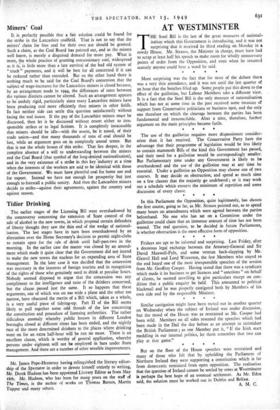Miners' Coal
It is perfectly possible that a fair solution could be found for the strike in the Lancashire coalfield. That is not to say that the
miners' claim for free coal for their own use should be granted.
Such a claim, as the Coal Board has pointed out, and as the miners well know, is merely a disguised demand for more pay. What is more, the whole practice of granting concessionary coal, widespread as it is, is little more than a late survival of the bad old system of " truck " payments, and it will be best for all concerned if it can be reduced rather- than extended. But on the other hand there is nothing much to be said for the Coal Board's contention that the subject of wage-increases for the Lancashire miners is closed because, by an arrangement made in 1944, the differences of rates between the various districts cannot be altered. Such an arrangement appears to be unduly rigid, particularly since many Lancashire miners have been producing coal more efficiently than miners in other fields. In fact neither side can settle this question satisfactorily without facing the real issues. If the pay of the Lancashire miners must be discussed, then let it be discussed without resort either to irre- sponsible strikes or to legal fictions. It is completely inexcusable that miners should be idle—with the assent, be it noted, of their trade union—and that many thousands of tons of coal should be lost, while an argument goes on in completely unreal terms. But that is not the whole lesson of this strike. That lies deeper, in the complete absence of a will to understanding between the miners and the Coal Board (that symbol of the long-desired nationalisation), and in the very existence of a strike in this key industry at a time when the interests of the workers are said to be identical with those of the Government. We must have plentiful coal for home use and for export. Instead we have not enough for prosperity but just enough to forestall a public outcry. And then the Lancashire miners decide to strike—against their agreements, against the country and against reason.






































 Previous page
Previous page